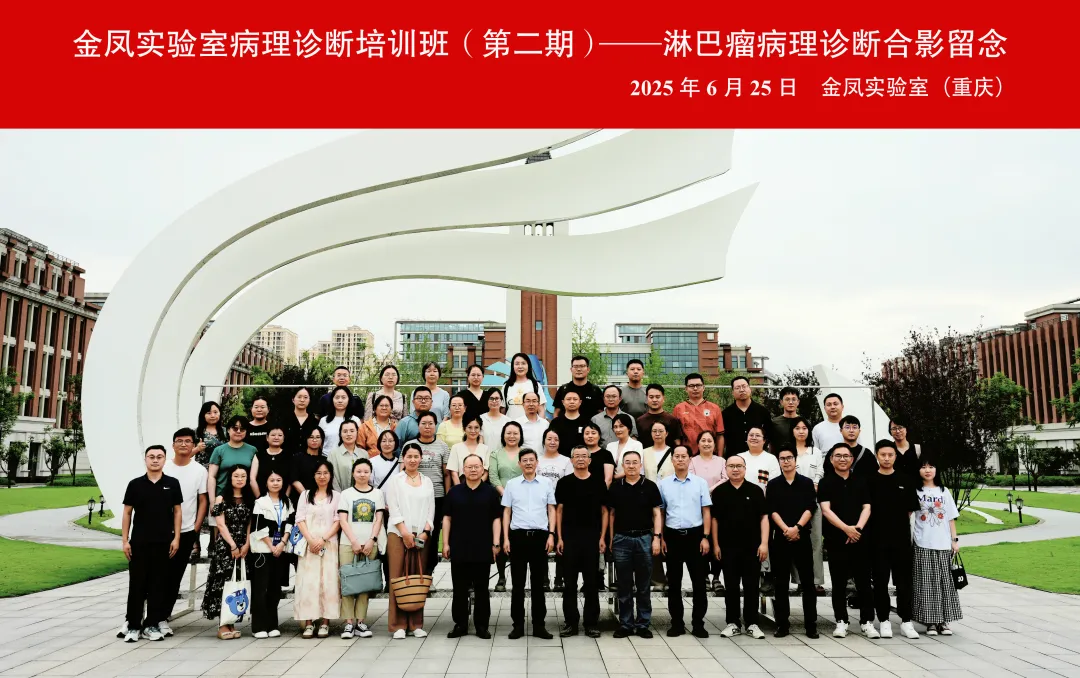
Jinfeng Laboratory Pathology Diagnosis Training Class (Phase II) - The pathology diagnosis of lymphoma was successfully held
From June 23 to 27, Jinfeng Laboratory Pathology Diagnosis Training Class (2nd Phase) - Lymphoma Pathology Diagnosis was successfully held. The training was hosted by Chongqing Jinfeng Laboratory, co-organized by the First Affiliated Hospital of the Army Military Medical University, the First Affiliated Hospital of the Air Force Military Medical University, the Lymphoma Pathology Group of the Pathology Branch of the Chinese Medical Association, the Lymphoma Group of the Oncology Pathology Committee of the Chinese Anti-Cancer Association and the Lymphoma Capacity Improvement Project Group of the Health Commission Capacity Building Center. It aims to improve the accurate diagnosis ability of domestic pathologists in the field of lymphoma and promote the standardization and precision of lymphoma pathology diagnosis. 50 pathologists from medical institutions at all levels in more than 20 provinces (autonomous regions, municipalities) across the country participated in the training.

At the opening ceremony, Bian Xiuwu, an academician of the Chinese Academy of Sciences and director of the Jinfeng Laboratory, delivered an online speech, highly affirming the training class, and encouraging students to deepen their professionalism and improve the overall level of lymphoma pathological diagnosis in my country. Professor Yan Xiaochu from the Jinfeng Laboratory Pathology Precision Diagnosis Center introduced the training courses in detail. Deputy Director Xu Hui of Jinfeng Laboratory presided over the opening ceremony.
The training invited five top domestic lymphatic hematopoiesis subspecialist pathology experts, including Professor Sun Qi from the Institute of Blood Research, Chinese Academy of Medical Sciences, Professor Li Xiaoqiu from the Cancer Hospital Affiliated to Fudan University, Professor Wang Zhe from the First Affiliated Hospital of the Air Force Military Medical University, Professor Chen Gang from the Fujian Cancer Hospital, and Professor Zhou Xiaoge from the Beijing Ludaope Hospital. The training is closely linked to the core of "precision diagnosis". The course design is based on "film reading training as the main focus, theoretical teaching as the supplement". The content covers the application of diagnostic technologies such as bone marrow tissue morphology and diagnosis, common B-cell lymphoma (invasive and inert), T-cell lymphoma, pathological diagnosis and differential diagnosis of histocellular and dendritic cell tumors, and the application of diagnostic technologies such as gene rearrangement, etc., and introduces the latest progress.
During the five-day training, more than 70% of the time, section teaching was conducted, case explanations and difficult case reading discussions were conducted separately. Experts guided the students step by step to master diagnostic ideas and skills. The students showed a high enthusiasm for learning and conducted in-depth discussions with experts and peers in the training classroom to ensure a full understanding and mastery of the knowledge they learned. During this period, the students also visited the Jinfeng Laboratory Advanced Pathology Science and Technology Museum and the Jinfeng Pathology Precision Diagnosis Center to experience the first-class research platform up close.
After the training, the students said that the content of this training was cutting-edge and practical, which provided great help in solving difficult cases in daily work. They hoped to participate in more relevant training in the future, continuously improve their professional abilities, and contribute to improving the level of accurate pathological diagnosis.
As the organizer of the training class, Jinfeng Laboratory will build a high-level learning and communication platform based on its own characteristics and advantages, and cultivate pathological accurate diagnosis talents through continuous opening of pathological diagnosis training classes, continuously improve the professional capabilities of pathologists in my country, and jointly promote the overall development of my country's pathology disciplines.
- About Us
-
Research Platform
- Major Disease Sample Database
- Innovative Drug Verification And Transformation Platform
- Experimental Animal Center
- Life And Health Future Laboratory
- Biomedical Imaging Platform
- Cell Multi-Omics Platform
- Pathology Technology Platform
- Bioinformatics Research And Application Center
- Jinfeng Pathology Precision Diagnosis Center
- Research Team
- Information Center
- Join Us


 渝公网安备50009802002274
渝公网安备50009802002274